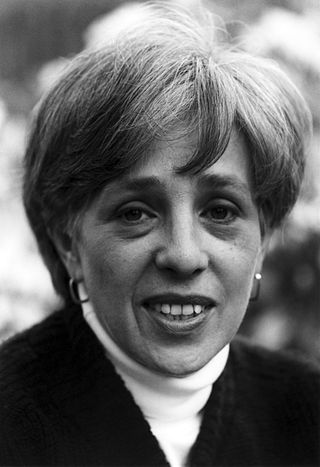The Joseph L. Mailman School of Public Health is the public health graduate school of Columbia University. Located on the Columbia University Medical Center campus in the Washington Heights neighborhood of Manhattan, New York City, the school is recognized by the Council on Education for Public Health.

Maxine Frank Singer is an American molecular biologist and science administrator. She is known for her contributions to solving the genetic code, her role in the ethical and regulatory debates on recombinant DNA techniques, and her leadership of Carnegie Institution of Washington. In 2002, Discover magazine recognized her as one of the 50 most important women in science.

Margaret Ann "Peggy" Hamburg is an American physician and public health administrator, who is serving as the chair of the board of the American Association for the Advancement of Science (AAAS) and co-chair of the InterAcademy Partnership (IAP). She served as the 21st Commissioner of the U.S. Food and Drug Administration from May 2009 to April 2015.

Martha May Eliot, was a foremost pediatrician and specialist in public health, an assistant director for WHO, and an architect of New Deal and postwar programs for maternal and child health. Her first important research, community studies of rickets in New Haven, Connecticut, and Puerto Rico, explored issues at the heart of social medicine. Together with Edwards A. Park, her research established that public health measures could prevent and reverse the early onset of rickets.

Ethel Collins Dunham (1883–1969), and her life partner, Martha May Eliot, devoted their lives to the care of children. Dunham focused on premature babies and newborns, becoming chief of child development at the Children's Bureau in 1935. She established national standards for the hospital care of newborn children and expanded the scope of health care for growing youngsters by monitoring their progress in regular home visits by Children's Bureau staff.

The Edward Jenner Medal is awarded occasionally by the Royal Society of Medicine to individuals who have undertaken distinguished work in epidemiological research.
Vanessa Northington Gamble is a physician who chaired the Tuskegee Syphilis Study Legacy Committee in 1996.
Shirley F. Marks is an American psychiatrist. She was the second African-American woman to graduate from Harvard Medical School.
Barbara Ross-Lee, D.O. is an American physician, academic, and the first African-American woman to serve as dean of a U.S. medical school; she is also known as the sister of global music sensation Diana Ross along with being the aunt of actress Tracee Ellis Ross, and singer-songwriters Rhonda Ross Kendrick and Evan Ross. She majored in biology and chemistry at Wayne State University, graduating in 1965. Then, in 1969, she entered Michigan State University's College of Osteopathic Medicine. Ross-Lee then went on to open her own private family practice, teach as a professor, and hold other positions within the medical community. In 1993, she was elected as the first woman dean of a medical school, at Ohio University's Heritage College of Osteopathic Medicine. She has earned several awards and honors for her work and accomplishments.

Camara Phyllis Jones is an American physician, epidemiologist, and anti-racism activist who specializes in the effects of racism and social inequalities on health. She is known for her work in defining institutional racism, personally mediated racism, and internalized racism in the context of modern U.S. race relations. During the COVID-19 pandemic, Jones drew attention to why racism and not race is a risk factor and called for actions to address structural racism.
Jessie M. Bierman was born on April 6, 1900, at Egan Slough near Kalispell, Montana, to Henry and Alice Bierman. She received her bachelor of arts from the University of Montana in 1921 and got a medical degree from Rush Medical College of the University of Chicago in 1926. She earned a master of public health at the Institute of Columbia University fifteen years later.

Uché Blackstock is an American emergency physician and former associate professor of emergency medicine at the New York University School of Medicine. She is the founder and CEO of Advancing Health Equity, which has a primary mission to engage with healthcare and related organizations around bias and racism in healthcare with the goal of mobilizing for health equity and eradicating racialized health inequities. During the COVID-19 pandemic Blackstock used social media to share her experiences and concerns as a physician working on the front lines and on racial health disparities and inequities exposed by the pandemic. She is best known for her work amplifying the message on racial health inequities and her media appearances speaking on the COVID-19 pandemic. She has been featured on Meet the Press, PBS NewsHour, Slate and Forbes among others. Blackstock became a Yahoo! News Medical Contributor in June 2020.
Helen L. Smits was a health policy influencer and advocate in the United States, and lent her voice to several healthcare initiatives abroad. Most notably, she was a recipient of the Fulbright scholarship and served under the Carter and Clinton administrations. She also held positions in government organizations including the National Institutes of Health (NIH) and Healthcare Financing Administration.
Marisa Bartolomei is an American cell biologist, the Perelman Professor of Cell and Developmental Biology and Co-Director of the Epigenetics Institute at the Perelman School of Medicine at the University of Pennsylvania. Her research considers epigenetic processes including genomic imprinting. She was elected to the National Academy of Sciences in 2021.
Michelle Asha Albert is an American physician who is the Walter A. Haas Lucie-Stern Endowed Chair in Cardiology and professor of medicine at the University of California, San Francisco. Albert is director of the UCSF Center for the Study of Adversity and Cardiovascular Disease. She is president of the American Heart Association. She served as the president of the Association of Black Cardiologists in 2020–2022 and as president of the Association of University Cardiologists (2021–2022). Albert is an elected member of the National Academy of Medicine and the American Society of Clinical Investigators.
Martha Gulati is the past Chief of Cardiology at the University of Arizona, Phoenix. She previously held the Sarah Ross Soter Chair in Women’s Cardiovascular Health at the Ohio State University. Gulati is the Chair of the National Chest Pain Guidelines. She is the author of the popular science book Saving Women’s Heart and Editor-in-Chief of materials for the American College of Cardiology programme CardioSmart.

Claire Brindis, DrPH, is a Distinguished Emerita Professor of Pediatrics and Health Policy, Department of Pediatrics and Department of Obstetrics, Gynecology and Reproductive Health Sciences and Emerita Director of the Philip R. Lee Institute for Health Policy Studies at the University of California, San Francisco (UCSF). Her research considers women's, adolescent and child health, as well as adolescent pregnancy prevention strategies. She was elected a member of the Institute of Medicine in 2010.

Eugenia Lathy Mobley McGinnis was an American dentist. She was dean of the dental school and vice-president at Meharry Medical College in Nashville, Tennessee.
Siobhan Wescott is an American educator who is Professor of American Indian Health at the Nebraska Medical Center College of Public Health. She was previously Director of the Indians into Medicine program at the University of North Dakota, where she trained hundreds of Native American physicians. In 2022, she was included by Stat News on their definitive list of leaders in the life sciences.
Catherine Mason Gordon is an American pediatrician who is Professor of Paediatric Medicine at the Baylor College of Medicine. In 2021 she became the first woman to be the Pediatrician-in-Chief at Texas Children's Hospital.









